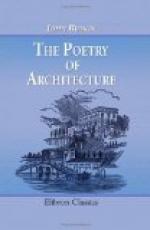177. If possible, however, he should aim at something more; he should draw his employer into general conversation; observe the bent of his disposition, and the habits of his mind; notice every manifestation of fixed opinions, and then transfer to his architecture as much of the feeling he has observed as is distinct in its operation. This he should do, not because the general spectator will be aware of the aptness of the building, which, knowing nothing of its inmate, he cannot be; nor to please the individual himself, which it is a chance if any simple design ever will, and who never will find out how well his character has been fitted; but because a portrait is always more spirited than a composed countenance; and because this study of human passions will bring a degree of energy, unity, and originality into every one of his designs (all of which will necessarily be different), so simple, so domestic, and so lifelike, as to strike every spectator with an interest and a sympathy, for which he will be utterly unable to account, and to impress on him a perception of something more ethereal than stone or carving, somewhat similar to that which some will remember having felt disagreeably in their childhood, on looking at any old house authentically haunted. The architect will forget in his study of life the formalities of science, and, while his practiced eye will prevent him from erring in technicalities, he will advance, with the ruling feeling, which, in masses of mind, is nationality, to the conception of something truly original, yet perfectly pure.
178. He will also find his advantage in having obtained a guide in the invention of decorations of which, as we shall show, we would have many more in English villas than economy at present allows. Candidus[33] complains, in his Note Book, that Elizabethan architecture is frequently adopted, because it is easy, with a pair of scissors, to derive a zigzag ornament from a doubled piece of paper. But we would fain hope that none of our professional architects have so far lost sight of the meaning of their art, as to believe that roughening stone mathematically is bestowing decoration, though we are too sternly convinced that they believe mankind to be more shortsighted by at least thirty yards than they are; for they think of nothing but general effect in their ornaments, and lay on their flower-work so carelessly, that a good substantial captain’s biscuit, with the small holes left by the penetration of the baker’s four fingers, encircling the large one which testifies of the forcible passage of his thumb, would form quite as elegant a rosette as hundreds now perpetuated in stone.




